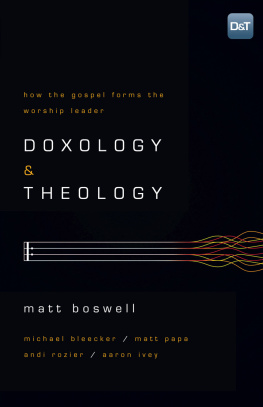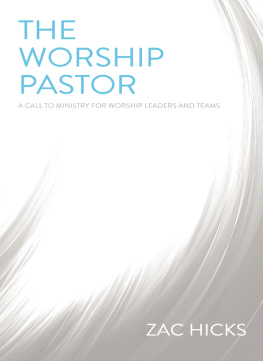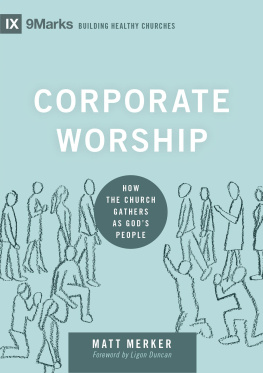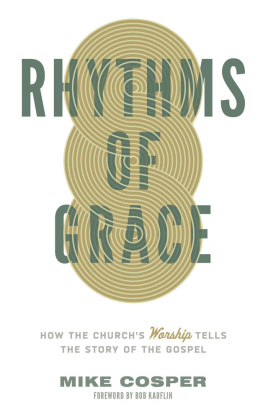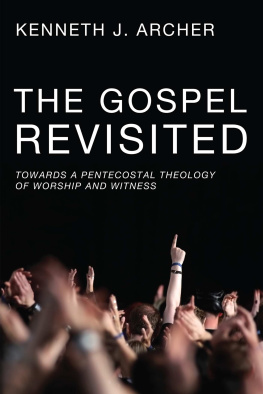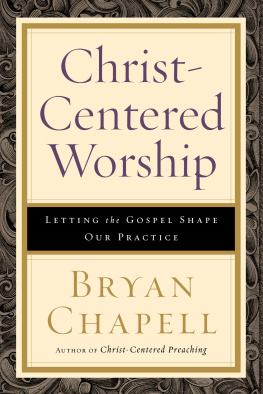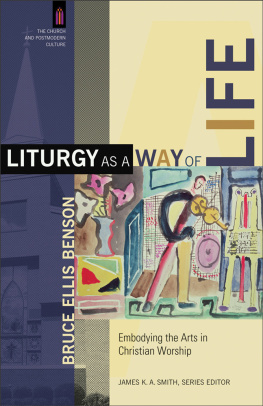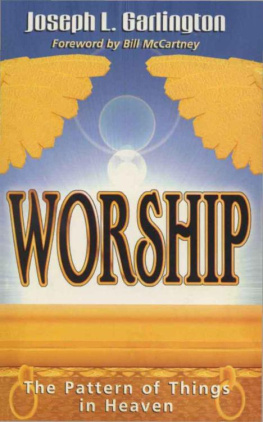Acknowledgments
T hank you to each of the authors of this book. You men have a deep love for the glory of Christ, and the good of his church. You each walk faithfully in light of the declaration of the gospel and call your churches to the same. I am deeply thankful that men like you are leading local congregations in the worship of our God.
Thank you to the lead pastors of each of our churches: Geoff Bradford, Matt Carter, Matt Chandler, J.D. Greear, Josh Harris, Darrin Patrick, David Platt, Tullian Tchividjian, and Afshin Ziafat. Each of you men have influenced not only your worship leader, but all of the authors of this book in countless ways. Thank you for shepherding us and allowing us to shepherd alongside of you in the work of the ministry. Thank you also to each of the wonderful congregations represented, for allowing your worship leaders to lead you and also influence others beyond your own church.
Thank you Elliot Grudem and Mike Hall for planting this seed, and Josh Patterson for helping it grow. Thank you to our friends at LifeWay who have helped make this idea a reality: Eric Geiger for your leadership and Jedediah Coppenger for seeing this book through to completion. Thank you also to Ron Man and Kim Stanford for your editing contributions.
Thank you to my parents and grandparents, Dr. Charles and Patti Boswell, Rev. Ronald and Marlene Boswell, and Ernest and Billie Sue Easley for instilling in me a deep love for the church and to see the worship of Jesus form His people.
Finally, thank you to my bride, Jamie, who believes with me that the church continually stands in need of a gospel reformation and that worship plays a vital part in this effort. Your love, friendship, and partnership in our home and church is a continual evidence of Gods grace.

Doxology, Theology,
and the Mission of God
Matt Boswell, Providence Church
(Frisco, Texas)
In many ways I was a Pharisee from birth. I continually validated myself by my progress in knowing and retaining information about God, the Scripture, and the nature of man. I grew up the son of a Southern Baptist pastor, with a deep love for the Word of God. I went to state finals in Bible drill, and in Sunday school, I typically beat the other kids to the answers.
Nevertheless, as I approached adulthood, when I heard the word theology, I increasingly felt second-class. More and more, it seemed my knowledge of God was not as developed or as informed as other men. Perhaps theology is for real pastors, while lyrics and melodies are for worship leaders. Maybe preaching pastors and professors have the corner on deep truth, while worship leaders are relegated to the shallow waters of elementary learning.
I was wrong.
Theology is not intended for the elite, but for all of Gods people. One of the promises of the new covenant is that God would write His law upon our hearts. Hebrews 10:16 says, This is the covenant that I will make with them after those days, declares the Lord: I will put my laws on their hearts, and write them on their minds. We are able know God because He has revealed Himself to us.
In the late twentieth century, between the rise of the praise and worship movement and the dawn of the seeker sensitive church, the modern expression of the worship leader was birthed. Shaped by influential songwriters, and later by Christian pop stars, the song leaders of churches went through a tremendous reformation. While there are both positive and negative aspects of these developments, there remains great confusion over the role of the worship leader: Are we pastors who sing, or artists who pastor? What does our theology say about the role of worship, and specifically the worship leader?
After talking with friends about this around the country, it became clear that there was a longing in the church for theological worshippers, with a blazing passion for truth and the glory of God. Worship should not to be driven by pragmatism, but informed by the Word of God. There must be a marriage between theology and doxology. Worship leaders are called to be men who pursue and practice biblical worship, and call their churches to the same. Or, as Psalm 96 puts it, there are to be five marks of the worship of the church.
Five Marks of the Worship of the Church
The worship of the church is God-centered.
Psalm 96 is a microcosm of some crucial perspectives Scripture gives us. This psalm was originally written for the covenant people of God for the entry of the Ark of the Covenant into Jerusalem (1 Chron. 16). This psalm shapes doxology, theology, the worship leader, and the mission of the church.
Oh sing to the L ord a new song;
sing to the L ord , all the earth!
Sing to the L ord , bless his name;
tell of his salvation from day to day.
Declare his glory among the nations,
his marvelous works among all the peoples! (vv. 13)
We find in these verses six imperatives commanded by God, through the psalmist. There are three calls to sing to the L ord , and one call each to bless his name, tell of his salvation from day to day, and declare his glory among the nations. The psalm itself is modeling this worshipful response for us as the people of God. In the commands to sing, what kind of singing is called for? Who should be singing? What types of songs are decreed? The churchs worship should be marked by a God-centered, Trinitarian, gospel emphasis.
What kind of singing is called for? Sing to the L ord , we see, is commanded. When the church is gathered together in the name of God, only singing which glorifies Him is appropriate. We dont sing corporately because it was our idea. We sing because it was Gods idea for His people. Since it is God who has commanded us to sing, it is God who will also determine what kind of songs we will sing. We are to sing to Him and for Him. Our songs are not meant to be entertainment, or a distraction from God. As Gods people, the primary content of our songs are psalms, hymns and spiritual songs (Eph. 5:19; Col. 3:16).
Our worship should express more of what God has done for us, and less of what we will do for Him. The worship leader is often tasked with choosing the songs to be sung in church, so this should be done with great intentionality and care. Mark Dever and Paul Alexander give this advice to pastors and worship leaders: As the main teaching pastor (or worship leader), it is your responsibility to shepherd the congregation into the green pastures of God-centered, gospel-centered songs, and away from the arid plains of theological vacuity, meditations on human experience, and emotional frenzy. Weightlessness is a result of deficient theological perspectivesfrom preaching to singing, when we develop primarily a man-centered view of worship (anthropocentric) rather than a God-centered view of worship (theocentric).
My proposal here is not that addressing the needs of man is irrelevant. My aim is to propose that as we call the attention of our congregations first to God and His revelation, then mans needs will be addressed as well. Edification of the church, evangelism, and disciple-making are all benefits of God-centered worship. What we see modeled in this psalm is a God-centered view of worship that then edifies hearers by reminding them of salvation (v. 2), while also producing an evangelistic effect (vv. 1014).
We see in the text that we are to sing new songs . The church has been given a song to sing. Our song is a song of salvation. As the people of God we are meant to be continually writing new songs that confess the tenets of our faith in fresh, creative, and meaningful ways. However, new songs are not an end in themselves. The new song we sing is informed by the old song, and looks with anticipation toward the new song we will sing in heaven (Rev. 5:810).
Next page
